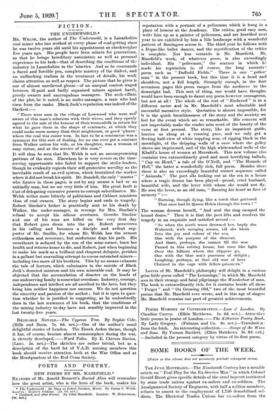FICTION.
THE UNDERWORLD.• Me. WELSH, the author of The Underworld, is a Lanarkshire coal miner who has worked at every phase of coal-getting since he was twelve years old until his appointment as checkweigher five years ago. His people have been miners for generations, so that ho brings hereditary association as well as personal experience to his task—that of describing the conditions of the industry in Lanarkshire in the 'nineties. And as he commands a fluent and forcible pen, complete mastery of the dialect, and an unflinching realism in the treatment of details, his work claims attention as well as respect. The picture that he gives is one of almost unrelieved gloom—of an unequal contest waged between ill-paid and badly organized miners against harsh, greedy owners and unscrupulous managers. The arch-villain of the plot, be it noted, is an under-manager, a man who had risen from the ranks. Black Jock's reputation was indeed of the blackest :- "There were men in the village of Lowwood who were well aware of this man's relations with their wives, and they openly agreed to the sale of the honour of their womenfolk in return for what he gave them in the shape of contracts, at which they could make more money than their neighbours, or good `places' where the coal was easier won. In fact to be a contractor was a synonym for this sort of dealing, for no one ever got a contract from Walker unless his wife, or his daughter, was a woman of easy virtue, and at the service of this man."
It will thus be seen that Mr. Welsh is not an uncompromising partisan of the men. Elsewhere he is very severe on the time- serving opportunists who failed to support the strike-leaders, though he evidently regards their sell-protective servility as the inevitable result of an evil system, which brutalized the worker where it did not break his spirit. Mr. Runde% the only " master " who figures in these pages, is not by any means a bad or an unkindly man, but we see very little of him. His great fault is Oat of delegating excessive powers to corrupt subordinates. Mr. Welsh writes more bitterly of politicians and Cabinet ministers than of coal owners. The story begins and ends in tragedy. Robert Sinclair's father is practically sent to his death by Walker, the under-manager, in revenge for Mrs. Sinclair's refusal to accept his odious overtures. Geordie Sinclair and one of his sons are killed on the very first day that Robert goes down into the pit. Robert perseveres in his calling and becomes a disciple and ardent sup- porter of Mr. Smillie, for whom Mr. Welsh has the utmost enthusiasm and reverence, but misfortune dogs his path. His sweetheart is seduced by the son of the mine-owner, loses her health and returns home to die, and Robert, just when beginning to make his mark as a brilliant and eloquent delegate, perishes in a gallant but unavailing attempt to rescue entombed minors— including two more of his brothers. This by no means exhausts the tale of horrors, which culminates in the suicide of Black Jock's deserted mistress and his own miserable end. It may be objected that the accumulation of disaster on the heads of one undeserving family is somewhat overdone. Industry, courage, independence and intellect are all ascribed to the hero, but they bring him neither happiness nor success. We do not question the sincerity and passion of the author ; but it is open to ques- tion whether he is justified in suggesting, as he undoubtedly does in the last sentences of his book, that the conditions of the mining industry to-day have not sensibly improved in the List twenty-five years.


































 Previous page
Previous page